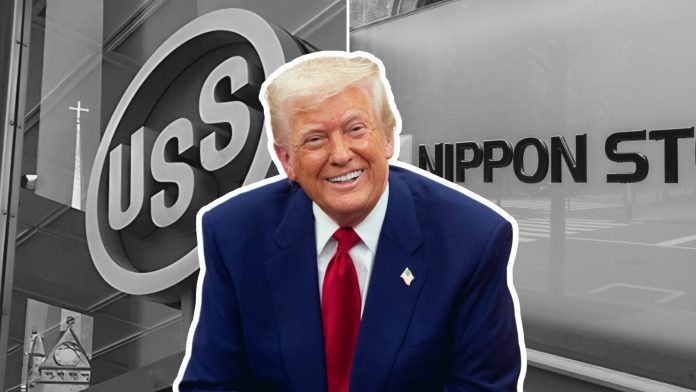President Donald Trump appeared to signal support last week for a long-disputed partnership between U.S. Steel Corp. and Japan’s Nippon Steel Corp., reigniting investor optimism, but without confirming whether he would approve the Japanese firm’s proposed $14.1 billion takeover.
On Friday, May 23, Trump announced what he called a “planned partnership” between the two steelmakers, claiming it would create “at least 70,000 jobs” and inject $14 billion into the U.S. economy. Yet he stopped short of endorsing Nippon Steel’s full acquisition bid and insisted U.S. Steel would “remain in America.”
Speaking again on Sunday at Morristown Airport in New Jersey, the president reiterated his ambiguous stance, telling reporters: “It’ll be controlled by the United States; otherwise, I wouldn’t make the deal.”
Meanwhile, Japan’s Chief Cabinet Secretary Yoshimasa Hayashi said Monday that Tokyo is still awaiting a formal statement.
Despite the uncertainty, markets responded strongly. U.S. Steel shares surged more than 21% Friday, peaking at a 26% intraday jump, as investors hoped the presidential remarks signaled progress on the acquisition. Nippon Steel stock also climbed as much as 7.4% in Tokyo on Monday before settling around 2% higher.
Both companies issued statements welcoming the president’s comments, calling the announcement a “bold” move and praising the partnership. Neither clarified what form the deal would take or what ownership structure might emerge.
Trump’s position represents a major reversal from December, when he posted on social media that he was “totally against” U.S. Steel being sold to a foreign buyer; a stance that aligned him with his predecessor, Joe Biden, who blocked the takeover earlier this year after a national security review by the Committee on Foreign Investment in the United States.
Now, with Trump offering at least partial approval, attention turns to how the deal would be structured. Analysts caution that while the investment could rejuvenate the iconic U.S. steelmaker, it may burden Nippon Steel with obligations to operate aging, less-efficient plants and subject the firm to U.S. political oversight for years to come.
Furthermore, the timing of Trump’s remarks also coincides with ongoing U.S.–Japan trade talks. Japanese trade negotiator Ryosei Akazawa met with Commerce Secretary Howard Lutnick and U.S. Trade Representative Jamieson Greer in Washington last week, following a call between Trump and Japanese Prime Minister Shigeru Ishiba.
However, for now, Nippon Steel’s long-fought effort to secure control of U.S. Steel, after 17 months of lobbying and negotiations, remains in limbo.



